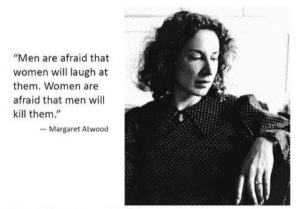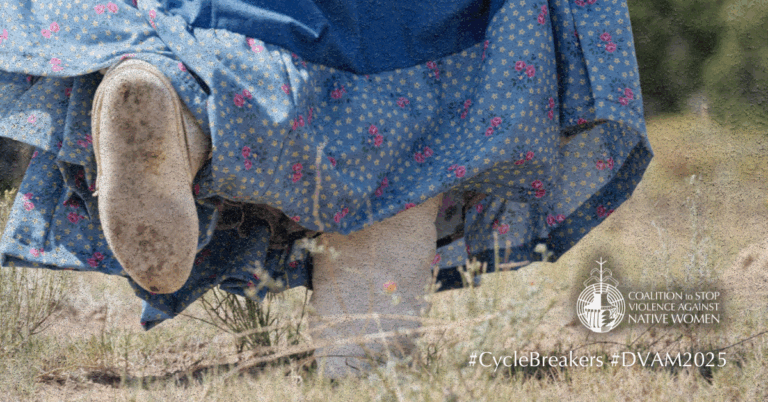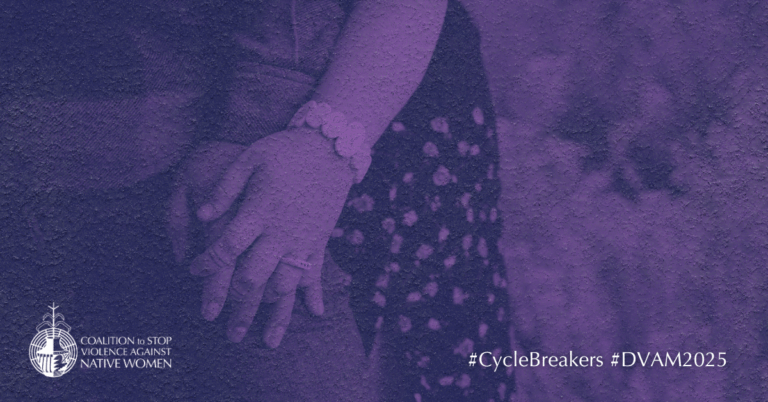Using Domestic Violence Awareness Month to Start the Conversation -Kim Benally (Navajo Nation)
 Prior to joining the Coalition to Stop Violence Against Native Women, I believed I had no experience working with the domestic violence and sexual assault field. I readily told the hiring committee of my lack of experience in the field. Since that time, I have almost completed a year of service with CSVANW to date and have realized, after attending a multitude of trainings and presentations, that I have extensive knowledge of abuse, of power and control. I just never named it for what it was. No, I was not in an abusive relationship, but my life was interspersed with experiences of abuse. Complicit. My family had normalized abuse, it was not always physical abuse, but also emotional abuse. We had become complicit. My aunt/cousin sister/cousin brother/niece have all been in abusive relationships. Reality hit me. I did have experience with abuse.
Prior to joining the Coalition to Stop Violence Against Native Women, I believed I had no experience working with the domestic violence and sexual assault field. I readily told the hiring committee of my lack of experience in the field. Since that time, I have almost completed a year of service with CSVANW to date and have realized, after attending a multitude of trainings and presentations, that I have extensive knowledge of abuse, of power and control. I just never named it for what it was. No, I was not in an abusive relationship, but my life was interspersed with experiences of abuse. Complicit. My family had normalized abuse, it was not always physical abuse, but also emotional abuse. We had become complicit. My aunt/cousin sister/cousin brother/niece have all been in abusive relationships. Reality hit me. I did have experience with abuse.
So how do I address this? I pose this question to everyone reading this.
What does the pink ribbon stand for? Breast cancer awareness, right? Yep, October is Breast Cancer Awareness Month. But did you know it’s also Domestic Violence Awareness Month?
In response, how can we, people like me, who believed abuse didn’t directly affect me, make a difference? What can we do to have an impact? There are numerous studies completed that show the horrific amount of abuse a native woman will encounter during her lifetime (i.e. 4 out of 5 native women will experience violence in their lifetime and over 50% of native women will experience sexual abuse). These statistics are readily available, but where are the studies that show the beauty of being a native woman? Those stories are there in our communities.
Many Native communities have ceremonies marking significant life events. In my Navajo culture, we celebrate a girls’ transition to becoming a woman through ceremony. Families come together to help prepare the young lady for her journey as woman. Our families and communities come together to help and support one another. Our Native communities have survived years of violence, violence from outside forces and violence from within (in NM 88% of violence against Native women is committed by Native men) by coming together as a community. Just as we, as a community, come together to celebrate important life events. So my beautiful Native people, we, as native communities, hold the solution (you’re probably thinking well duh!).
The solution must be inclusive. Inclusive of our whole communities. This is where you and I come in. Starting now, starting today, how can we contribute to the solution? There are many ways we can become part of the solution, here are some suggestions:
Become familiar with what domestic violence is—
We can’t begin to address domestic violence until we acknowledge it. There are very informative resources available to help us do this:
http://www.huffingtonpost.com/news/unhealthy-relationships/
To find a wealth of information, visit the Futures Without Violence page: https://www.futureswithoutviolence.org/
Start the conversation—-
As Native people, we have relatives, lots of them. Start the conversation with those you love. Talk to your children, nieces, nephews, grandbabies. Talk about healthy boundaries, dating violence, healthy relationships, consent.
Take a look at the Native Youth Sexual Health Network: http://nativeyouthsexualhealth.com/
And here is a great Youtube video explaining consent: https://www.youtube.com/watch?v=fGoWLWS4-kU
Like and follow CSVANW on instagram– www.instagram.com/CSVANW1
We share tons of information on domestic violence and sexual assault awareness, we hold trainings that are free for service providers and those interested in becoming part of the solution, we also post some great Snapchats of the beautiful prevention work our Native Youth Coordinator is doing.
Like and follow us on Facebook: https://www.facebook.com/coalitiontostopviolenceagainstnativewomen
Follow us on Snapchat: @csvanw
Attend one of our events, find our events here: https://dev.csvanw.org/our-events/csvanw-annual-calendar/
And finally, if you’re really inclined and want to make a donation, become a CSVANW member:
Related Posts

Running Towards Healing and Justice
By: Ang Gonzales (they) intern at CSVANW Community Voice This Domestic Violence Awareness Month, I…

Our Stories, Our Strength: Voices of Cycle Breakers
Storytelling has always been medicine. For generations, our stories have carried the wisdom of our…

10 Years of Healing in Motion
The Story of CSVANW’s I Will Run for Them 5K Every October, during Domestic Violence…
